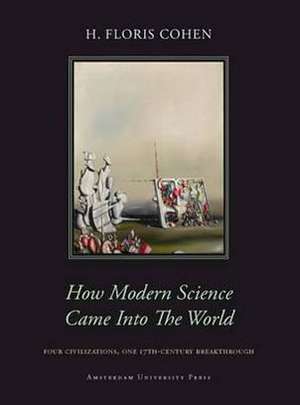How Modern Science Came into the World: Four Civilizations, One 17th-Century Breakthrough
Autor H. Floris Cohenen Limba Engleză Hardback – 2012
Key to his analysis is a vision of the Scientific Revolution as made up of six distinct, yet tightly interconnected revolutionary transformations, each of some twenty-five-to-thirty years’ duration. This vision enables him to explain how modern science could come about in Europe rather than in Greece, China, or the Islamic world.'
Preț: 803.46 lei
Preț vechi: 1292.60 lei
-38% Nou
Puncte Express: 1205
Preț estimativ în valută:
153.74€ • 160.95$ • 127.21£
153.74€ • 160.95$ • 127.21£
Carte indisponibilă temporar
Doresc să fiu notificat când acest titlu va fi disponibil:
Se trimite...
Preluare comenzi: 021 569.72.76
Specificații
ISBN-13: 9789089642394
ISBN-10: 9089642390
Pagini: 784
Ilustrații: 66 halftones
Dimensiuni: 171 x 218 x 48 mm
Greutate: 2.02 kg
Editura: Amsterdam University Press
Colecția Amsterdam University Press
ISBN-10: 9089642390
Pagini: 784
Ilustrații: 66 halftones
Dimensiuni: 171 x 218 x 48 mm
Greutate: 2.02 kg
Editura: Amsterdam University Press
Colecția Amsterdam University Press
Notă biografică
Floris Cohen is professor of comparative history of science at Utrecht University in the Netherlands.
Cuprins
Preface
Prologue: Solving the Problem of the Scientific Revolution
Part I: Nature-Knowledge in Traditional Society
1. Greek Foundations, Chinese Contrasts
2. Greek Nature-Knowledge Transplanted: The Islamic World
3. Greek Nature-Knowledge Transplanted in Part: Medieval Europe
4. Greek Nature-Knowledge Transplanted, and More: Renaissance Europe
Part II: Three Revolutionary Transformations
5. The First Transformation: Realist-Mathematical Science
6. The Second Transformation: A Kinetic-Corpuscularian Philosophy
7. The Third Transformation: To Find Facts through Experiment
8. Concurrence Explained
9. Prospects around 1640
Part III: Dynamics of the Revolution
10. Achievements and Limitations of Realist-Mathematical Science
11. Achievements and Limitations of Kinetic Corpuscularianism
12. Legitimacy in the Balance
13. Achievements and Limitations of Fact-Finding Experimentalism
14. Nature-Knowledge Decompartmentalized
15. The Fourth Transformation: Corpuscular Motion Geometrized
16. The Fifth Transformation: The Baconian Brew
17. Legitimacy of a New Kind
18. Nature-Knowledge by 1684: The Achievement So Far
19. The Sixth Transformation: The Newtonian Synthesis
Epilogue: A Dual Legacy
Endnotes
Name Index
Subject Index
